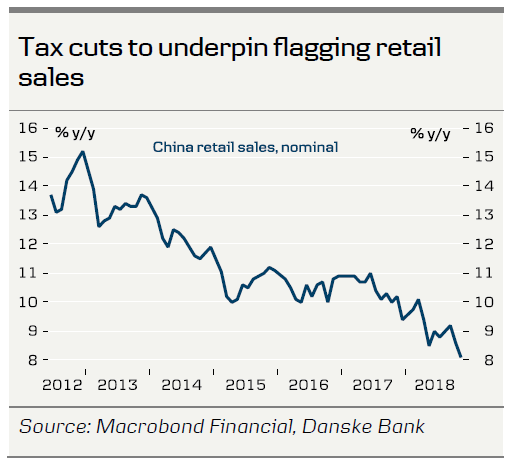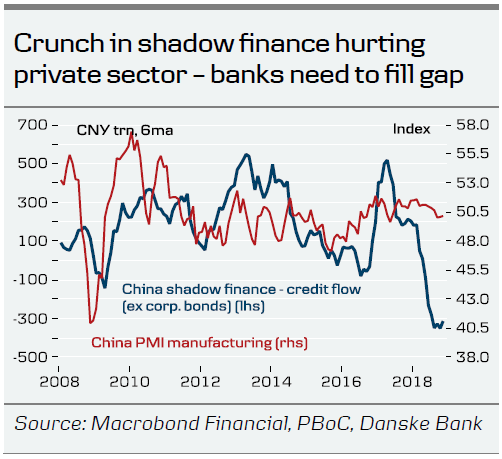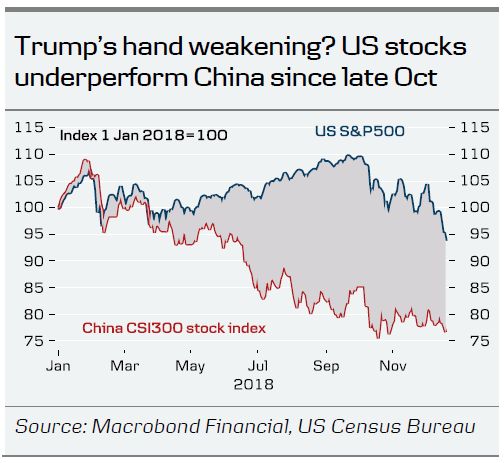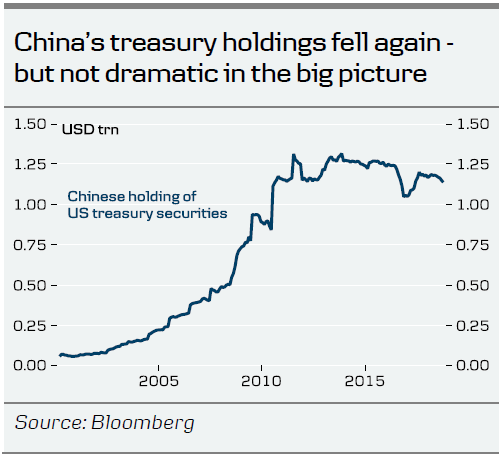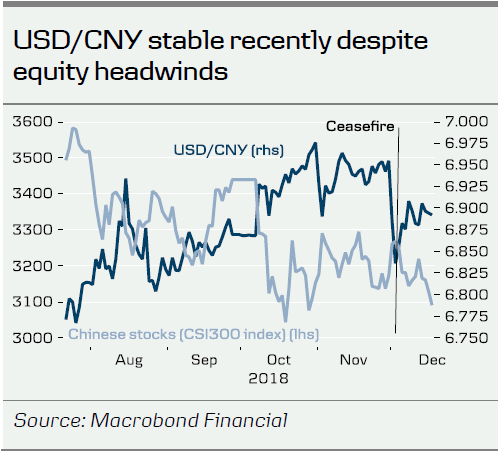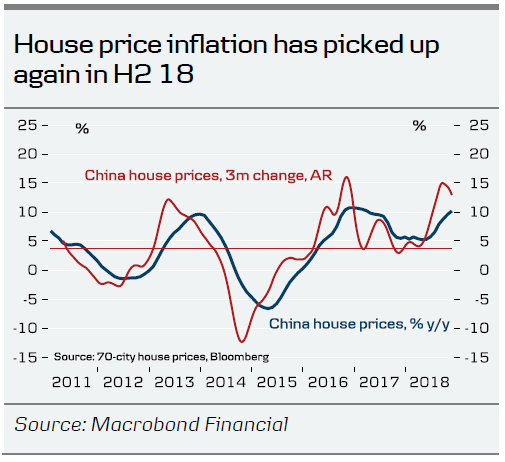- A major tax cut to consumers and corporates is coming in 2019.
- 40-year anniversary of reform and opening-up marks reform path.
- US-China trade deal to be ‘enforceable and verifiable’.
Major tax cuts coming in response to economic weakness
It is increasingly clear that China is preparing for a major tax cut in 2019 . A China Daily article this week with the title ‘ Major tax cuts are on the horizon ‘ speaks of a tax cut for households and corporates of more than 1% of GDP. On Tuesday, the annual Central Economic Work Conference will lay out economic policies for the coming year. An announcement on tax cuts and possibly new reform measures could come on the back of it.
In a further effort to support for the private sector, on Tuesday the central bank, the People’s Bank of China, announced a new facility to provide cheap medium-term funding for banks lending to smaller businesses. The rate will be 3.15% of loans up to three years to banks that support the real economy. It compares with a rate of 3.5% on a one-year money market rate. The private sector is smarting from a crunch in shadow finance, which needs to be filled by the banks (see chart).
Comment . A tax cut underpins growth and increases expectations that China will weather the storm and recover at some point in 2019. The tax cut will come on top of other stimulus measures this year such as cuts in the Reserve Requirement Ratio for banks, lending targets for the private sector and faster approval of infrastructure projects. Our main scenario is still that the Chinese economy will get worse before it gets better and that China will recover from around Q2 on the back of a trade deal with the US and stimulus kicking in. See China Outlook – short-term pain, long-term gain , 13 December 2018.
Celebration of 40-year anniversary of reform and opening-up
In a speech in celebration of the 40-year anniversary of China’s reform and opening-up policy, Xi Jinping pledged that China will continue the policy path started in December 1978 . ‘Opening up brings progress while closure leads to backwardness’, he said. However, he also stressed that China would reform in its own way. ‘There is no textbook of golden rules to follow for reform and development in China, a country with over 5,000 years of civilization and more than 1.3bn people…no-one is in a position to dictate to the Chinese people what should or should not be done’ (see People’s Daily, 19 December 2018).
At the celebration, the leadership awarded 100 Chinese citizens medals of reform pioneers. Among the recipients were Jack Ma and Pony Ma , founders of China’s two tech giants Alibaba and Tencent. Former World Bank Chief Economist Justin Yifu Lin also received a medal. Lin is still an advisor to the Chinese government and this week was one of several Chinese economists to urge China to step up reforms to offset the trade war impact. See South China Morning Post , 16 December.
Comment. Xi’s speech mostly repeated previous pledges to continue reforms and opening-up and did not bring much new. There had been some hope that the speech would provide specific reform measures but this was not the case. However, in general, we believe China’s reform efforts are better than its reputation. On 31 October, the Doing Business Report by the World Bank showed that China had jumped 30 places up the list and was the no. 3 country to have made the most reforms to improve the business climate for small and medium enterprises. An illustration of the improving business climate is that around 15,000 private companies have opened annually (more than 10 per hour) in recent years. Still, we also see plenty of room for China to reform further and current headwinds should be used to speed up reforms further.
Trade talks in January – deal to be ‘enforceable and verifiable’
US Treasury Secretary Stephen Mnuchin stated this week that the two sides are talking on a Vice Ministerial level and are planning face-to-face meetings in January. See Bloomberg: China and U.S. Talk on Trade Ahead of January Negotiations and SCMP: US and China trade negotiators will sit down in January, 18 December. He also revealed that the US and China have agreed that any eventual deal would have to be ‘enforceable and verifiable and have specific dates on it’.
At a two-year review of US trade policy, China and the EU lambasted the US over its break of WTO rules (see Reuters, 17 December). ‘The multilateral trading system is in a deep crisis and the United States is at its epicentre’, said EU Ambassador Mark Vanheukelen. However, US trade ambassador blamed China for pursuing ‘non-market industrial policies and other non-market competitive practices’.
US treasury holdings declined in October for the fifth consecutive month raising questions marks over whether this was a deliberate move as part of the trade war. See China Daily: China remains largest foreign buyer of US Treasury bonds in Oct, 18 December.
Comment. The US and China seem to be in agreement that the arrest of the Huawei CFO recently should be kept separately. We expect negotiations to continue and still look for a deal within the next three-six months. Trump’s hand has weakened further recently as US markets have started to underperform Chinese equities (top chart). There will be a battle over the reform of WTO but this is also likely to be kept separately. The decline in treasury holdings is not dramatic (see chart) and is probably related to China’s intervention this year to keep the CNY from weakening too much (requires selling of USD reserves to buy CNY).
Other China news
Revision to our USD/CNY forecast. We no longer look for USD/CNY to rise above 7 in 12M as we now expect a trade deal to include a commitment from China to stop CNY depreciation. We now look for USD/CNY at 6.80 in 12M.
House price inflation still robust. Prices on residential property increased 10.3% y/y in October (see bottom chart). Housing is one of the pillars benefiting from the decline in bond yields and giving support to the otherwise weak economy.
Bankruptcies surge in China (see Bloomberg, 16 December). This is an effect of the shadow banking squeeze but also a change in policy to let more companies go bankrupt to avoid moral hazard. Therefore, it is an effort to clean up and discipline the financial sector.
Boeing opened its first factory in China (see Reuters, 15 December). China is expected to overtake the US as the world’s largest aviation market over the next decade.
Germany tightens rules for foreign investment in a move aimed at China (see Reuters, 16 December).

